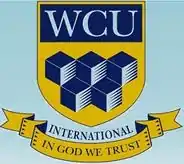West Coast University (Panama)
West Coast University of Panama is a higher education provider based in Panama.[1][2]
West Coast Institute of Management & Technology | |
 | |
Former names | West Coast Institute of Management & Technology(WCIMT) |
|---|---|
| Type | Autonomous Educational Institution |
| Established | 1996 |
| President | Prof. Dr. S. Lloyd |
| Vice-president | Dr. M. Kafafy |
| Rector | Prof. Dr.Carlos Gustavo Lavado Roqué |
| Registrar | Quinn Lloyd |
| Location | , |
| Mascot | athletics = |
| Website | www.westcoastuniversity.edu.pa |
History
The "West Coast Institute of Management & Technology (WCIMT)" was established in 1996 at Perth by a Christian family "S. Lloyd Family Trust" to provide vocational and Professional Educational Services at National and International Levels under a Christian mission and vision of preaching, teaching and Social work. It is an Autonomous Educational Institute and Vocational Training School.
The institute was a registered and accredited training institution, accredited by the Training Accreditation Council (TAC) of the Training Department of the Government of Western Australia, and is listed on the "Commonwealth Register of Institutions and Courses" (CRICOS), which provide accredited courses to local and overseas students up to Graduate Diploma Level.
WCIMT established a chain of affiliated colleges in many countries. In 2004, the trustees decided to use this infrastructure to establish the West Coast University in a favorable country; on the recommendations of faculty members West Coast University was incorporated at Panama City, under article 19 of law 32 of 1927. The word "West Coast" does have an historical background in Panama. West Coast University, although based in Panama, serves as a global institute for autonomous higher education.
In March 2007 a Bangladesh online newspaper reported that the nation's education ministry and University Grants Commission had found that West Coast University was operating illegally in Bangladesh and the education ministry was seeking to sue the institution for offering bachelor's degree courses without government authorization. Government personnel said that in 2006 West Coast had opened a campus in Khulna, where in February 2007 the school began conducting courses in electrical and electronic engineering, civil engineering, mechanical engineering and architecture.[3]
In July 2012, an English-language online newspaper for Panama reported that West Coast University was advertising courses to be conducted there, but Panama's National Council of University Assessment and Accreditation (CONEAUPA) and Ministry of Education said the institution was not accredited and they had no record of the institution being legally established or having approved curricula.[4]
As of December 2012, West Coast University is a candidate for accreditation from the Accreditation Council for Business Schools and Programs, for its bachelor's and graduate programs in business.[5]
As of January 2013 West Coast University is now accredited by the International Accreditation Organization (IAO). The IAO is not recognised by the Council for Higher Education Accreditation or the Council for Higher Education Accreditation.[6][7][8]
References
- "UGC asked to sue West Coast University – Panama". The Daily Newspaper. Dhaka. April 17, 2007. Archived from the original on 5 December 2008.
- "Unaccredited colleges". Oregon Office of Degree Authorization. Archived from the original on May 25, 2011.
This name [West Coast University] is used by multiple unaccredited entities. The extent to which they are related is unknown. All outside the U.S. are considered degree mills because they lack appropriate governmental authority to issue degrees.
- Siddiqur Rahman Khan (April 17, 2007). "UGC asked to sue West Coast University – Panama". The Daily Newspaper. Dhaka. Archived from the original on 5 December 2008.
- Don Winner (July 9, 2012). "West Coast University of Panama Called Into Question". Panama Guide. Retrieved 15 December 2012.
- "Current ACBSP Accredited Programs and Members". Accreditation Council for Business Schools and Programs. Archived from the original on 2012-10-01.
- Arne J Almquist (2011). "Academic Libraries, Marketing, Accreditation, and Support". In Sharon G. Almquist (ed.). Distributed Learning and Virtual Librarianship. ABC-CLIO. p. 284. ISBN 978-1-59158-906-8.
- Unrecognized and Fake Agencies for Online College Accreditation, GetEducated.com, retrieved January 24, 2012
- Paul Fain (October 19, 2012). "Startup University's Phantom Faculty". Inside HigherEd.
International Accreditation Organization (IAO), [is] a self-described "secondary" accrediting body that seeks to "recognize and accredit education providers on an international scale", according to its website. The Texas-based accreditor said its seal of approval is not to be claimed as a primary accreditation, which is how Cambridge Graduate is using it. [George] Gollin questioned relying on the accreditor in any capacity. He cited bogus degree providers on IAO's list of accredited institutions, including one with ties to a known degree mill operator. ... Gollin notes that one of IAO's fully accredited institutions is the University of Antarctica (motto: "Big Continent, Big Opportunities"), which the accreditor recently removed from its website. ... Accrediting the University of Antarctica should be a "one-strike-you're-out disqualification", Gollin said. And any institution that "describes its couplings with IAO as a positive attribute is not to be taken seriously."